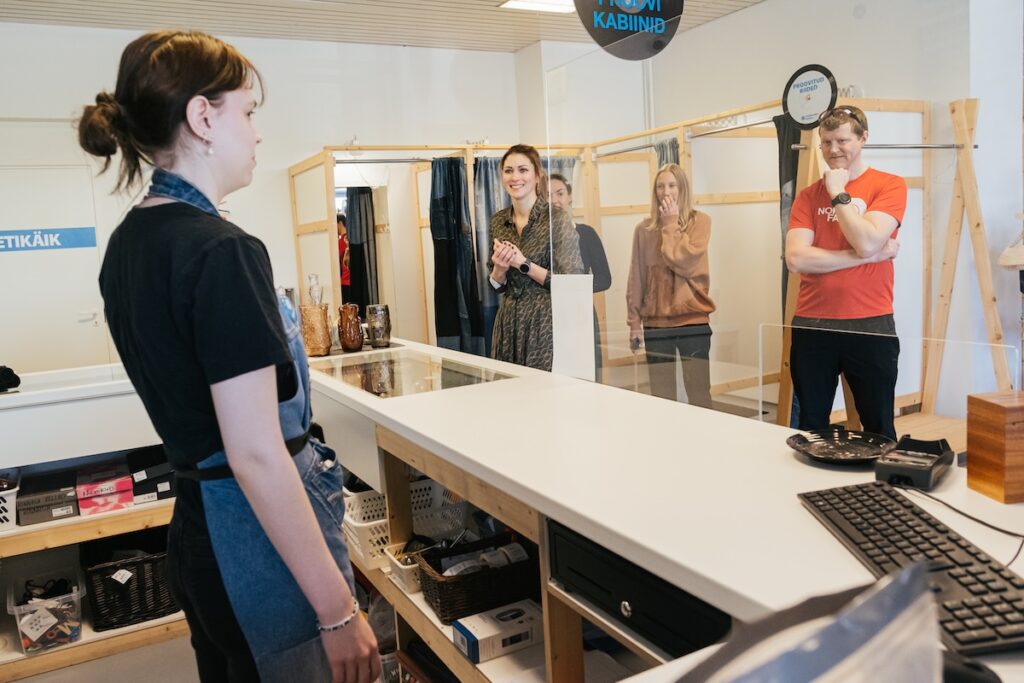Case Tallinn | Sewing Repair Workshop
Author: Teele Joost, Project Manager, Tallinn Strategic Management Office
The implementation of a sewing repair workshop in Tallinn is a prime example of a successful circular economy initiative. Launched in collaboration with Tallinn Strategy Management Office, MTÜ Uuskasutuskeskus and Tallinn University of Applied Sciences, the workshop was designed to address the growing issue of textile waste by offering free repair services to citizens.
Tallinn’s Sewing Repair workshop was established as a temporary initiative to assess the public’s interest in repair services. One of its main objectives was to gather data on how willing people were to repair their clothing instead of discarding it. By providing a free repair service, the project aimed to determine whether citizens would actively seek out repair solutions if they were easily accessible and cost-free.
Background
The textile and clothing industry is one of the most polluting sectors globally, consuming vast amounts of land, water, energy, and chemicals. The fast fashion model encourages excessive consumption, leading to high levels of textile waste. To combat this issue, the European Union has implemented regulations promoting circular economy principles, aiming to extend the lifespan of textiles through reuse, recycling, and repair.
Tallinn’s 2022–2026 Waste Plan aligns with these principles, emphasising waste prevention, reuse, and recycling. One of the key initiatives under this plan is the transformation of waste stations into circular economy hubs, integrating reuse spaces and repair workshops.

Problem Identification
One of the major environmental challenges today is the short lifespan of clothing, exacerbated by the fast fashion industry. Many individuals dispose of textiles due to minor damages that could easily be repaired. However, professional repair services are often costly, discouraging people from choosing repair over replacement. Additionally, there is a lack of awareness regarding the environmental impact of textile waste.
Solution Implementation
The sewing repair workshop was strategically established within an existing reuse store (MTÜ Uuskasutuskeskus) to attract a community already inclined toward sustainability. The initiative provided free-of-charge repair services for up to three items per person, encouraging individuals to opt for repair rather than discarding textiles.
The workshop was equipped with industrial-grade sewing machines, materials, and skilled repair personnel. It also functioned as an educational hub where citizens could learn basic sewing and repair skills, empowering them to take sustainable actions independently.

Outcomes and Benefits
The workshop had a significant impact on both the environment and the local community:
- Waste Reduction: Hundreds of clothing items and textiles were saved from landfills, directly contributing to waste reduction efforts.
- Awareness and Engagement: The project increased awareness about the importance of textile repair and encouraged a behavioral shift toward sustainability.
- Economic Feasibility: By providing free repair services, the workshop demonstrated that small interventions can have large-scale benefits with relatively low investment.
- Social Inclusion: The initiative was accessible to all citizens, removing financial barriers to sustainable choices.
Following the temporary sewing repair workshop, Tallinn opened in November 2024 a permanent sewing repair room in Lilleküla Ringmajanduskeskus. This new workshop operates differently from the previous initiative—here, individuals are encouraged to take an active role in repairing their own items rather than dropping them off for free repair. Equipped with sewing machines and necessary tools, the Lilleküla workshop serves as a self-service space where people can come and mend their textiles independently or under the guidance of an on-site instructor.
To further support citizens, the Lilleküla workshop also offers guided sessions and workshops led by skilled instructors. These workshops provide hands-on training in basic and advanced repair techniques, fostering a community of self-sufficient repairers. However, unlike the previous free service, users must now participate in the repair process themselves, making it an educational and skill-building experience rather than a simple drop-off service.
Tallinn Sewing Repair Workshop
Project Duration: May 2023 – April 2024
Opening duration: 10 days a month
Location: Uuskasutuskeskus Store, Tallinn
Partners: Tallinn Strategy Centre, MTÜ Uuskasutuskeskus, Tallinn University of Applied Sciences
More than 300 customers with more than 700 repaired textile items
Key Benefit: Reducing textile waste by encouraging repair and reuse

